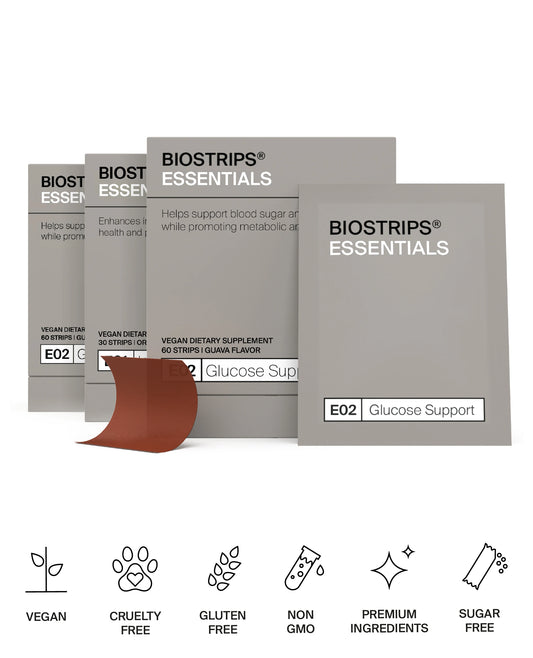Imagine a world where your body's own mechanisms, designed to fuel you, start working against you. This is the reality for those experiencing insulin resistance, a widespread metabolic condition where the body ineffectively uses glucose for energy.
Left unchecked, this condition can evolve into more severe issues like prediabetes and type 2 diabetes. In this article, let’s explore the foundations of blood sugar and insulin, the nuances between the two as well as discuss common symptoms of insulin resitance and how lifestyle and dietary strategies can be pivotal in managing this condition.
Are blood sugar and glucose the same thing?
Glucose, often referred to as blood sugar, is an essential type of sugar derived from the foods we eat. It serves as a vital source of energy for the body. As the primary sugar present in our bloodstream, it is crucial for maintaining the energy levels necessary for daily activities and bodily functions.
When we ingest food, particularly carbohydrates, the body breaks these down into glucose. This glucose is then released into the bloodstream, where it is transported to cells throughout the body and used as a primary energy source. The terms "blood sugar" and "blood glucose" are used interchangeably to describe this crucial substance in our blood that plays a key role in energy production and overall metabolic health.
How does insulin work?
Insulin is a vital hormone produced by the pancreas, playing a crucial role in managing blood sugar levels in the body. When we consume food, carbohydrates are converted into glucose, which enters the bloodstream. Insulin helps transfer this glucose from the blood into the cells across the body, where it is used as a primary energy source.
By enabling this process, insulin not only aids in energy production but also actively lowers blood sugar levels, maintaining them within a healthy range. This essential hormone ensures that our body's energy needs are met efficiently while preventing the potential dangers of high blood sugar, such as diabetes.
What is Insulin Resistance?
Insulin resistance is a metabolic condition where the cells in the body that typically use glucose for energy do not respond effectively to insulin, a hormone crucial for the metabolism of carbohydrates. Under normal circumstances, insulin assists these cells in absorbing glucose from the bloodstream, using it as a primary energy source. However, in insulin resistance, these cells fail to respond adequately to the hormone, making it challenging to transport glucose from the blood into the cells.
Because of this reduced sensitivity to insulin, the pancreas is prompted to produce more insulin in an attempt to elicit a proper response from the cells. This compensatory increase in insulin production can temporarily maintain normal blood glucose levels. However, if the condition persists and the cells continue to respond poorly, the excess glucose remains circulating in the blood. This ongoing high blood sugar can lead to several serious health issues over time.
Chronic high blood sugar due to insulin resistance is a primary risk factor for prediabetes, which, if unmanaged, may progress to type 2 diabetes. Additionally, the strain of persistently high insulin and glucose levels can lead to other severe health problems, including hardening of the arteries (atherosclerosis), hypertension (high blood pressure), and elevated triglyceride levels. These conditions further increase the risk of developing cardiovascular diseases, underscoring the significant impact of insulin resistance on overall health.
Are you symptomatic?
Insulin resistance can manifest through various symptoms that affect different aspects of an individual's health. Common symptoms include an increased thirst and a corresponding increase in urination, which are the body's ways of managing high blood sugar levels. People may also experience increased hunger due to the body's cells not receiving enough glucose, even though plenty is present in the bloodstream.
Blurry vision and frequent headaches are additional indicators resulting from the body's fluctuating fluid levels affecting the eyes and vascular system. Moreover, slow healing of wounds is another concerning symptom, as high blood sugar levels can impair blood flow and damage nerves, thereby delaying the body's natural repair processes.
How can I holistically treat insulin resistance?
Lifestyle adjustments are crucial to manage and possibly reverse insulin resistance. Increasing physical activity helps improve the body's sensitivity to insulin. In contrast, dietary changes, such as reducing carbohydrate intake and increasing consumption of soluble fiber, can significantly help manage blood sugar levels. Incorporating a wider variety of fruits and vegetables adds essential nutrients and antioxidants, reducing oxidative stress and improving overall health. Cutting back on sugar intake is also critical. Furthermore, drinking green tea has been suggested to enhance insulin sensitivity due to its antioxidant properties.
White Mulberry Leaf, Chromium, and Apple Cider Vinegar are essential ingredients that significantly manage blood glucose levels and combat insulin resistance. White Mulberry Leaf supports a healthy glucose balance and insulin response, which is crucial for metabolic health and effective in helping those with insulin resistance.
Chromium enhances insulin sensitivity, optimizing the body's ability to process glucose, thereby maintaining energy levels and overall metabolic wellness. Apple Cider Vinegar aids in stabilizing blood sugar by slowing digestion, which prevents sudden spikes in glucose levels, promoting a consistent energy flow and metabolic wellness. Including these supplements in a dedicated regimen can improve blood sugar management and insulin sensitivity.
Effectively managing insulin resistance necessitates a comprehensive strategy that includes both lifestyle modifications and dietary adjustments. By identifying symptoms early and adopting measures such as increasing physical activity, refining dietary choices, and considering supportive supplements like Reducose, individuals can significantly enhance their blood sugar control. For those experiencing symptoms or who are at risk of developing insulin resistance, consulting with a healthcare professional is crucial to develop a personalized and effective management plan. This proactive approach can greatly improve one's health outcomes and overall well-being.












